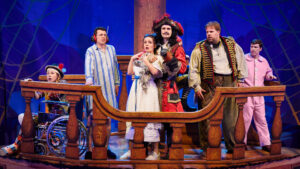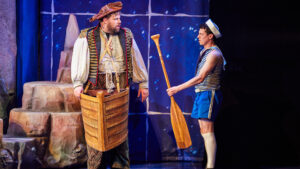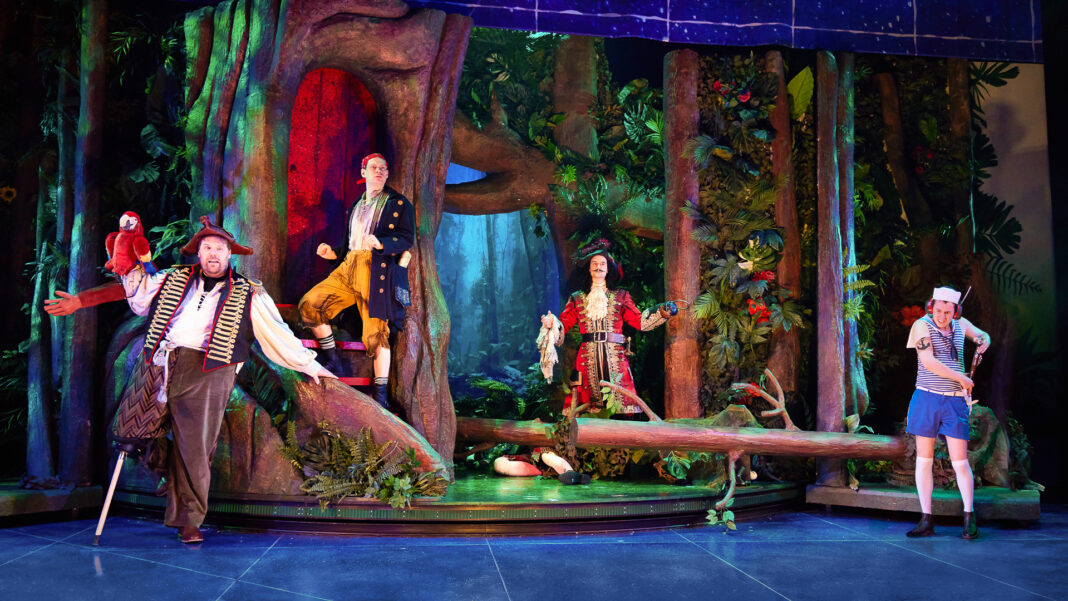The Oxford Dictionary defines mischief as “playfulness that is intended to tease, mock, or create trouble.” For anyone who has seen The Play That Goes Wrong, you know that The Cornley Drama Society at the center of that show gets a whole lot wrong. For creators Henry Lewis, Jonathan Sayer and Henry Shields, they wondered what mischief Cornley would get into if they tackled a known property. That moment of inspiration was the second star to the right that led to the creation of Peter Pan Goes Wrong which is now playing at the Ahmanson Theatre in Los Angeles through September 10th.
Lewis, Sayer and Shields formed Mischief Theatre in 2008. The Play That Goes Wrong was first presented with the name The Murder Before Christmas. The name was changed to suit the nature of the show. A year later Peter Pan Goes Wrong was introduced to the world.

A few days before opening night in Los Angeles, I spoke with the three men about the show, their approach to comedy and the value of failure. What follows are excerpts from our conversation that have been edited for length and clarity. To see the full interview (including the moment where the interview went wrong), please go to our YouTube channel.
Q: James M. Barrie, author of Peter Pan, is quoted as having said, “We are all of us failures, at least the best of us are.” Now it strikes me, having seen the BBC version of Peter Pan Goes Wrong, that Mischief Theater celebrates failure in its shows. So I’m wondering how failure inspires each one of you.
Sayer: I never heard that quote. I wish I had because that’s a really good one. We could have been using that for ten years, I suppose. A huge part of our work is all about highlighting mistakes and celebrating them; celebrating the funniness of them and the vulnerabilities of these characters that we’ve made. I think failure is an intrinsic part of Mischief’s work. But I think the nice thing about this show is it’s about this ragtag team trying to put on Peter Pan and anything that could happen goes wrong. But at the end, actually, there’s a bit of a victory. The characters manage to support each other and get through it.
Shields: Failure is an intrinsic part of the creative process. I think you have to be ready to fail, willing to fail and willing to embrace failure at every step of the process in order to improve. That’s the only way anything succeeds. No one gets it right first time. And we’ve failed. We’ve probably failed as much as we’ve succeeded over the course of our lives. But every success has hopefully been improved by the previous failure.
Lewis: You learn so much more from failing than from getting it right. If you get it right, that often is weird. I mean, if you sort of have a success with something or something goes well, you actually don’t necessarily learn a great deal.
Q: You’ve been doing this show for about 11 years at this point. Are there things that you’ve learned along the way with various productions of any one of your shows that has informed changes or improvements that you’ve made in the others?
Sayer: The main learning, I think, particularly with Goes Wrong shows, if you’re going to do a show that’s kind of related to another show, you want to make sure that you push the envelope a little further. We’ve always tried to make sure each show is bigger, more physically spectacular. The big learning is always to go back to the truth of the characters that we’ve created and back to the truth of the work that we’re doing and back to the fundamentals of what Mischief stands for.

Q: What are the physical challenges of getting this comedy right every night?
Lewis: It’s definitely a very physical show. There’s no question. You do get a bit battered. This is certainly the most physical. There’s lots of running around, falling over, getting up. You’re physically tired, but the audience tends to carry you through. [They] are enjoying it and laughing and so that gives you a bit of adrenaline and you mosey on through the show.
Shields: We’re all pretty heavily padded now where we wouldn’t necessarily have been when we started doing the show ten years ago. Now everyone’s got kneepads and shoulder pads and straps and ankle straps to keep us together because we’re in our thirties. And it’s not as easy as it used to be.
Sayer: I’ve not got any padding on because my costume is either very short shorts and a very skimpy t-shirt or essentially a kind of loose cotton bag. So there’s no way for me to have any padding. But you tend to feel it more after the show. Then in two days you realize, Oh, that’s damaged. Have I done that?
Q: How do you keep the comedy fresh, not just for the audience, but how do you keep it fresh for you as performers?
Sayer: I think that the comedy is kept fresh maybe in different ways. The first is the audience and what you get back from the audience that keeps it alive. I think the fact that we all genuinely find each other funny. We were doing a dress rehearsal the other day and I laughed quite a lot during the dress rehearsal and I think there was quite a lot of laughter in general. There’s a genuineness to it. We’re not just kind of, Oh my God, here we go again.
Lewis: The characters are aware of the audience and they’re listening to the audience and as a technical comedy craft challenge means that it’s always slightly different. You’re constantly taking in data from the audience and that is adjusting and affecting your performance and everyone’s performance. You collectively are working together.
Q: How much corpsing (breaking character and laughing in a scene) is allowed or happens through a given run?
Shields: It depends on the character because there are a couple of characters in the show who their schtick is that they are not taking it seriously and they’re having a really good time and happy to just laugh. One character in particular, Max, is free to laugh whenever he wants. So the actor who plays him [Matthew Cavendish], if anything tickles him even slightly, he’ll just openly laugh on stage. Which makes it very difficult for everyone else because my character in particular is what we call no use clown. Which means I can never laugh. If I laugh, then my entire character is shattered because I can’t be having a good time at any point. He’s having the worst night his life. How often it happens? I’d say it’s pretty rare.
Q: In Peter Pan Peter says “To die will be an awfully big adventure.” British actor Edmund Gwenn, best known as Kris Kringle in the original film of Miracle on 34th Street, said on his deathbed, “Dying is easy. Comedy is hard.” How do you reconcile these two statements and how does this apply to the work you do?

Sayer: My experience of actors in comedy is comedy is quite a binary world. Either people laugh, and therefore it is a success, or they do not laugh and it is therefore a failure. I think some people really don’t like that because they see that as quite harsh. I think if you really love comedy, and it’s in your bones, you find it quite soothing because it helps you sculpt the show. I find comedy probably easier than the living bit.
Shields: I don’t know if comedy is harder than drama. It’s difficult. I think probably the reason that people say that is that comedy has the immediate feedback that drama doesn’t. If you’re doing comedy, even if you’re good at it, you have to be good at it 100% at a time. Every joke has to land because as soon as one joke doesn’t land, you’ve died. You’re constantly skating on razor thin ice and one mistake and you have died. It feels absolutely awful to tell a joke and have no one laugh. It doesn’t matter if you told a thousand jokes before that point. The one you’ll remember is the one where you died. You can do a drama, and if it doesn’t quite work, you didn’t quite move people in the way that you intended to, you’ll never really know for sure because there’s no immediate feedback. That’s probably what makes the difference.
Q: But you wouldn’t have it any other way, would you?
Shields: Well, no, because the positive feedback when people laugh is instant gratification. That’s what we’re in for.
To watch the full interview with the creators of Peter Pan Goes Wrong, please go here.
Main Photo: Henry Lewis, Harry Kershaw, Henry Shields and Jonathan Sayer in Peter Pan Goes Wrong (Photo by Jeremy Daniel/Courtesy Center Theatre Group)











